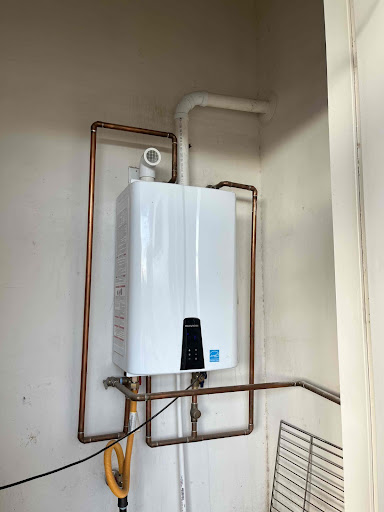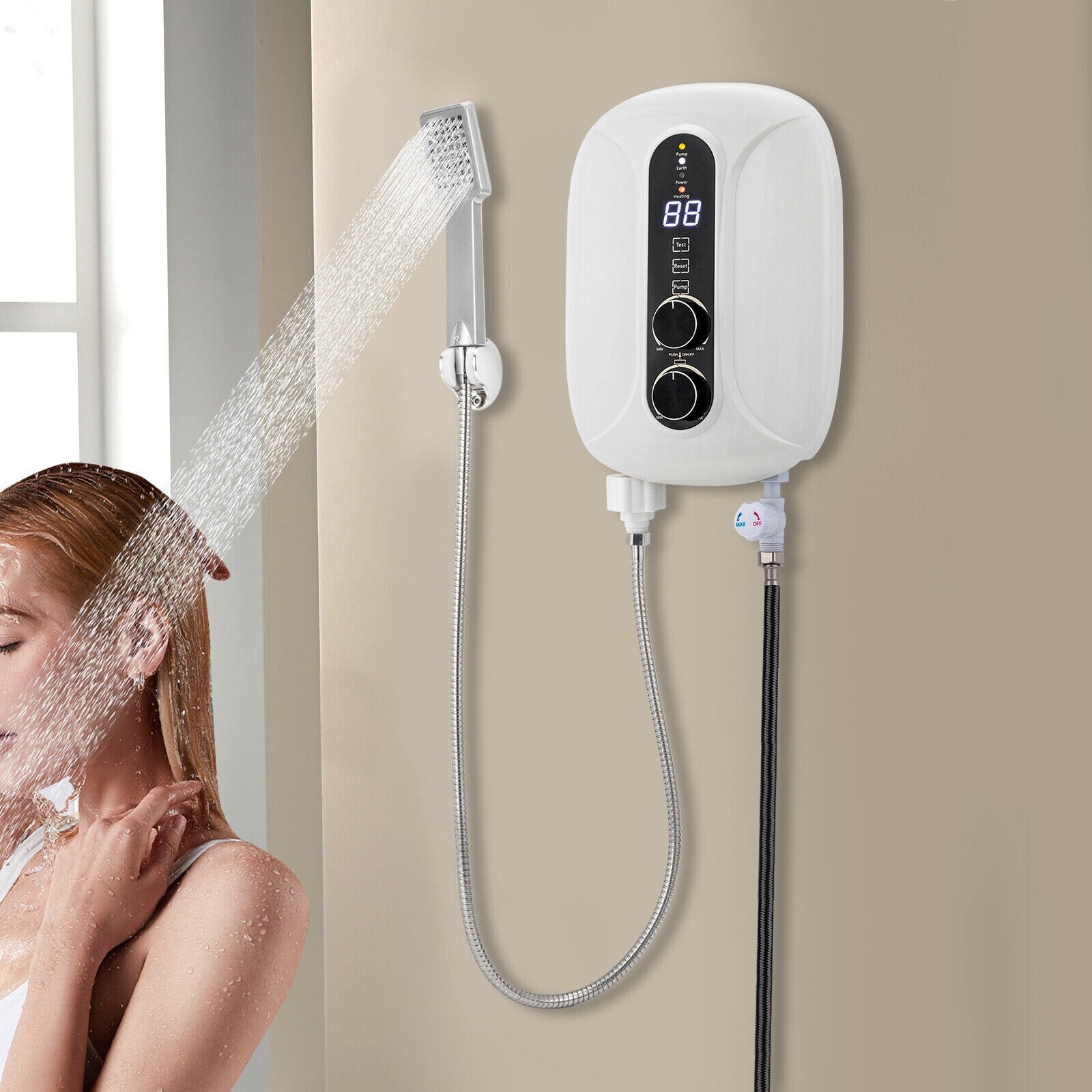Key Upsides Of Adopting Tankless Water Heaters
Key Upsides Of Adopting Tankless Water Heaters
Blog Article
Have you been in search of advise on Six Benefits of a Tankless Hot Water Heater?

In a globe where ease and performance reign supreme, it's not a surprise that house owners are regularly on the lookout for smarter means to handle their home's power usage and comfort. One technology that has continuously acquired popularity is the tankless hot water heater. But what exactly makes these systems stand out from the standard tank-based models the majority of us matured with? Allow's dive in and explore the benefits of tankless water heaters, helping you choose if it's time to make the switch in your home.
Introduction
Picture this: you enter the shower after a lengthy day, expecting a soothing cascade of hot water, only to be welcomed by icy beads due to the fact that the last individual utilized all of it up. Sound familiar? Conventional water heaters store a fixed quantity of warm water, suggesting you go to the grace of that storage tank's supply. Tankless systems, on the other hand, warm water on demand. Say goodbye to going out mid-shower, say goodbye to wrestling with routines simply to ensure warm water is offered.
Comprehending Tankless Water Heaters
What Are Tankless Water Heaters?
Tankless hot water heater, often known as on-demand or instantaneous water heaters, give hot water just as it's needed. Rather than keeping gallons of pre-heated water, these devices kick into activity the minute you turn on the faucet. Water passes through a warmth exchanger, heating up in real-time, suggesting you obtain a continuous flow of warm water without the demand for a huge storage tank resting lazily by.
How Do They Vary from Standard Systems?
Typical heaters hold a storage tank of hot water, utilizing energy to keep that storage tank at a consistent temperature. Tankless devices remove the standing supply, lowering lost power and the bulky impact of a huge cyndrical tube. Basically, you're upgrading from a "stockpile" frame of mind to a "made-to-order" approach.
Usual Types of Tankless Devices
Tankless water heaters usually are available in two selections: gas and electrical. Gas versions tend to deliver higher circulation prices, ideal for bigger houses, while electrical versions commonly offer smaller homes and are commonly much easier to mount. In addition, some systems are made for point-of-use (offering one fixture) while others can deal with the entire home's warm water requirements.
Key Benefits of Tankless Water Heaters
1. Endless Warm Water Supply
Ever needed to arrange showers so every person gets their fair share of warm water? With tankless, that comes to be a distant memory. As long as the heater's circulation capacity isn't exceeded, you can take back-to-back showers without turning into a popsicle.
2. Power Performance and Cost Financial Savings
Say goodbye to warming a giant container's worth of water and maintaining it toasty all day. Tankless heaters reduce standby power losses, which can reduce utility costs. While the preliminary expense could be higher, the long-term financial savings usually warrant the investment.
3. Space-Saving Design
If your home is short on storage, removing the bulky container frees up beneficial space. Tankless systems are compact and can often be mounted on wall surfaces, hidden in edges, or installed in limited utility wardrobes without hogging the entire area.
4. Longer Life-span
A well-kept tankless hot water heater can outlive its tank-based relative. Typical containers may last 10-15 years, while tankless designs can keep downing along for two decades or even more, making them a solid financial investment with time.
5. Improved Water Top Quality
Keeping water in a container can in some cases bring about debris build-up or a slightly "off" taste. With tankless systems, fresh water is heated up right away, decreasing the possibilities of sediment build-up and potentially offering cleaner-tasting water.
Factors to consider Before Switching
Though the advantages are compelling, it's smart to take into consideration a couple of factors prior to totally committing.
Preliminary Investment Expenses
Tankless heating units usually feature a higher in advance price tag. In between the device itself and prospective installation adjustments, the first expense may provide you sticker shock. Yet remember to see it as a long-term investment.
Installment Demands
Relying on your home's facilities, you might require extra electrical capacity or gas line upgrades. Ensure you comprehend the installation needs and talk to a professional to avoid surprises.
Evaluating Your Home's Water Use Patterns
If your house all at once makes use of numerous components with high warm water demand, make sure the system's circulation price fulfills your demands. Knowing your usage patterns assists you pick the ideal size and kind of tankless heating unit.
Upkeep and Treatment Tips
Tankless systems are fairly low maintenance, however they aren't set-it-and-forget-it appliances.
Regular Cleansing and Descaling
Tough water minerals can build up in the warm exchanger, influencing performance. Routine descaling (often recommended annually) keeps the system performing at peak performance.
Yearly Expert Examinations
A yearly checkup from an expert makes sure minor issues are caught early. They'll evaluate the system's performance, seek leaks, and aid maintain ideal performance.
Making Certain Appropriate Air Flow
For gas designs, proper air flow is vital to securely expel exhaust gases. Ensure airing vent systems are clean and correctly set up to prevent any prospective security hazards.
Contrasting Different Brands and Models
Not all tankless water heaters are developed equal.
Researching Dependable Makers
Look for respectable brands with a history of generating quality systems. A reliable producer frequently provides far better client assistance and longer guarantees.
Checking Out Testimonials and Customer Comments
User reviews and feedback from neighbors or good friends who have gone tankless can use useful insights. Occasionally, real-life experiences can be extra telling than marketing pamphlets.
Installation: Do It Yourself or Professional?
While some house owners delight in taking on projects themselves, tankless installation might not be the best time to burst out the tool kit.
Pros and Cons of DIY Setup
A do it yourself mount can save cash, but it features threats. Wrong setup can cause inefficiency or safety and security concerns. If you're handy and have experience, it may be viable-- yet wage caution.
When to Call an Expert Plumbing
For the majority of, calling a professional makes certain everything's done properly. An expert plumbing professional recognizes neighborhood codes, sizing requirements, and venting specifications, reducing the risk of mishaps.
Making best use of Performance
You've purchased a tankless device-- currently maximize its efficiency.
Optimum Temperature Level Settings
Lots of people establish their systems between 120-140 F. Readjusting the temperature can enhance convenience and financial savings. Experiment to locate a pleasant place that does not throw away power.
Coupling With Low-Flow Fixtures
Intend to extend your device's capabilities? Consider setting up low-flow showerheads and faucets. They reduce water usage, permitting your tankless system to provide a steady stream of warm water without straining.
Environmental Influence
Tankless water heaters straighten with greener living objectives.
Minimized Carbon Footprint
By utilizing much less energy and just home heating water as needed, tankless systems can decrease your home's carbon footprint, lowering your environmental influence.
Saving Natural Resources
Much less energy consumption and much less wasted warm water convert into less natural resources being made use of, an environmental win-win.
That Benefits Many from Tankless Heating systems?
The appeal of tankless heating systems is that they can suit a range of families.
Huge Households vs. Single Residents
Big households may like the unlimited hot water supply, while single residents appreciate the energy cost savings from not heating up an entire tank for just someone's early morning shower.
Homeowners with Minimal Room
If your home is short on square video footage, losing the bulky tank liberates space for various other basics-- or perhaps simply a lot more elbow room.
Eco-Conscious Consumers
Going tankless aligns with environmentally friendly values, guaranteeing you're not losing energy or sources.
Future Trends in Tankless Water Heaters
The world of home devices is ever-evolving, and tankless water heaters are no exception.
Smart Home Assimilation
Envision readjusting your water heater's temperature level using an app or obtaining maintenance informs on your phone. As smart home tech developments, we'll see even more connection and convenience.
Innovations in Technology
R&D is constantly improving warm exchangers, making systems extra reliable and sturdy. Future versions could be also quieter, extra portable, and better matched for differing environments.
Final thought
Selecting a tankless water heater is greater than simply updating your home's warm water system; it's purchasing long-term convenience, power effectiveness, and a greener way of living. By considering your house's water usage, being mindful of installment demands, and devoting to regular maintenance, you can appreciate a consistent stream of hot water without the baggage of a cumbersome tank. As innovation progresses, you can expect also smarter, more reliable tankless solutions that not only make your life much easier however additionally benefit the earth.
Why You Should Consider a Tankless Water Heater for Your Home
Energy Efficiency and Cost Savings
Tankless water heaters, also known as on-demand water heaters, heat water only when needed. This means they don't waste energy keeping a tank of water hot constantly. This efficiency translates into substantial cost savings on your monthly energy bills.
Endless Hot Water Supply
One of the significant advantages of tankless water heaters is their ability to provide a continuous supply of hot water. Traditional tank water heaters have a limited capacity and can run out of hot water, especially during peak usage times. In contrast, tankless water heaters can provide an endless stream of hot water, making them ideal for larger families or homes with high water usage.
Space-Saving Design
Tankless water heaters are compact and take up significantly less space compared to traditional tank heaters. They can be installed on walls, under cabinets, or even outside, freeing up valuable space in your home. This makes tankless water heaters a great option for smaller homes or properties with limited space for a traditional water heater.
Longer Lifespan and Lower Maintenance
Tankless water heaters typically have a longer lifespan compared to traditional tank heaters. They can last up to 20 years or more with proper maintenance. Additionally, tankless systems are designed with replaceable parts, which can extend their lifespan further and reduce long-term maintenance costs.
Environmentally Friendly
Reducing energy consumption not only saves you money but also benefits the environment. Tankless water heaters contribute to a smaller carbon footprint by using less energy to heat water. Their energy efficiency and ability to minimize standby heat loss make them an eco-friendly choice for environmentally conscious homeowners.
Customized Temperature Control
Tankless water heaters offer precise temperature control, allowing you to set the desired temperature to meet your specific needs. This level of customization ensures you always have water at the perfect temperature for your comfort and usage requirements.
https://beantownservices.com/blog/consider-tankless-water-heater-for-your-home

I hope you enjoyed our excerpt on Why You Should Consider a Tankless Water Heater. Many thanks for taking the time to read through our blog post. Do you know anybody else who is excited about the topic? Please feel free to promote it. Thank you for going through it.
Browse Our Site Report this page